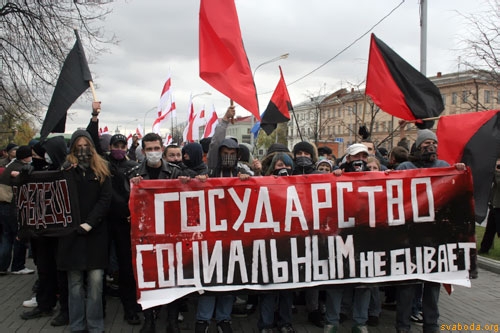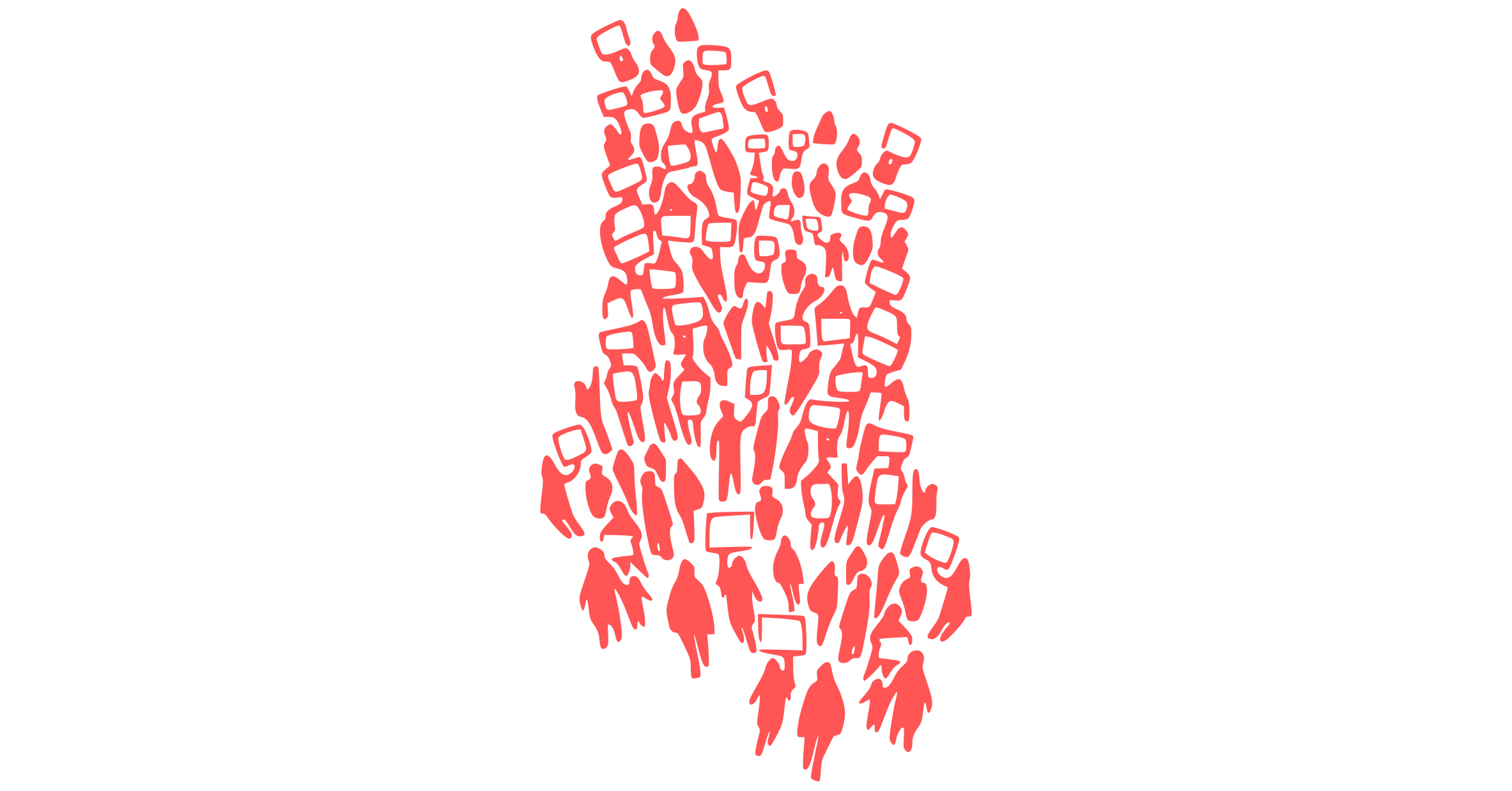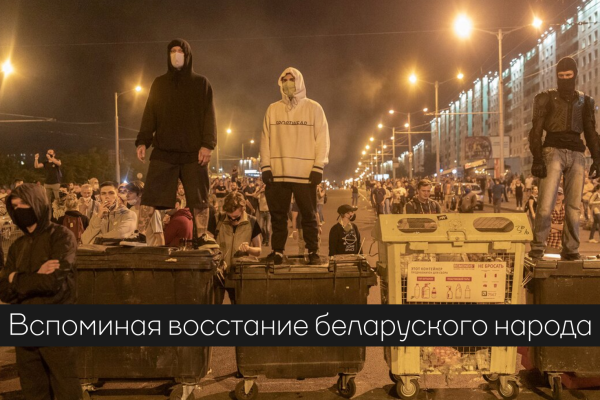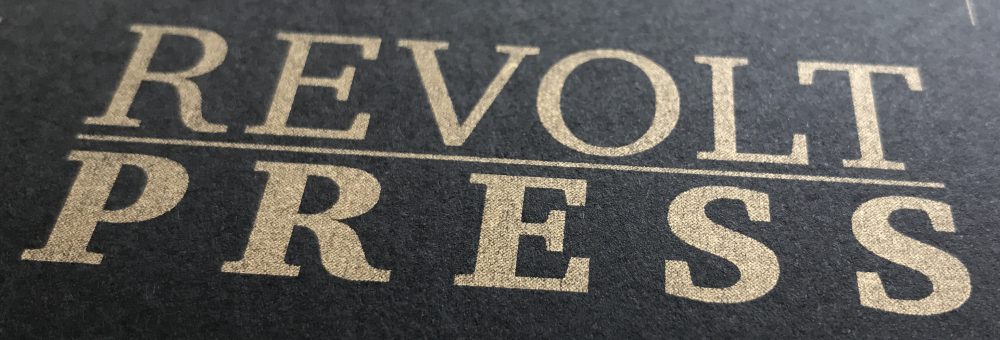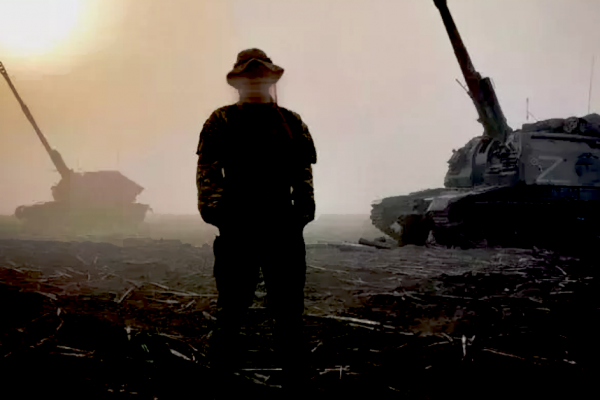What is the name of your anarchist group? When did your group begin actively organizing in Belarus? What have you done so far (we understand & respect omissions due to security issues)?
Our group is called Pramen (Belarusian «The ray»). The major direction of our work is online and offline propaganda of our ideas. We issue brochures and stickers for further distribution, have website and a net of blogs in a most popular Belarusian social media. It is quite hard to measure the results of our activities, but since we’ve formed (December, 2015), we have issued and distributed several thousands of anarchist brochures and stickers, also we’ve written tens of practical instructions for activists and political analytics. The core issue of our project is that we try to go out for a more wide auditory, thus we try make our texts and propaganda more interesting for common people.
What other anarchist groups are active in Belarus besides yourselves? Do you have a specific anarchist tendency?
The other active groups are: Volnaya dumka (“The free thought”) anarchist library, The Really Free market, Food not bombs, Anarchist Black Cross – Belarus, and our group.
What is the history of anarchism in Belarus? How long has anarchism been in Belarus? What is the timeline of anarchism there?
Anarchism was quite popular in Belarusian territories in the beginning of 20th century. One of the industrial cities – Belastok, was highly influenced by anarchists, who organized regular expropriations of food by the crowds of workers, and assassinated many policeman and bourgeoisie. The last anarchist groups in Belarus are spotted in the end of 1920s, later on they all were destroyed by the Bolsheviks.
Anarchism started to revive in Belarus in the end of 1980-s, along with Perestroika in USSR begun.
The first anarchist group “Borba” (The struggle) was created in Gomel in October, 1991.
Hard times came for Belarus after the dictator Lukashenko came to power in 1994. He is in power until now.
Anarchist movement was mostly subcultural or artist-performance issue until 2006-2007 when groups of subcultural anarchist youth started to organize in more political way and make political demands. The first time anarchists came to a stage of a public life was November, 2007, when we’ve participated in the protest rally against cutting social benefits in Belarus. We had a great fight with neonazis, which made us visible for a wide audience and exposed us to a general public.
During 2008-2009 anarchist movement experienced a rapid growth. On a sanctioned rallies we were gathering Black Block as big as 120-130 ppl
After a number of direct actions, conducted by our comrades against state and buiseness building in 2008-2010, the government started a huge crackdown on the movement in September, 2010. Around 100 anarchists and people who have links with them were arrested or interrogated. Finally, 5 of anarchists were accused in “hooliganism”, “setting arson” and other similar articles and three of us were sentenced to a prison terms: three, four and a half, and eight years. Other two started collaborated with cops, became a traitors and got a minor terms in a open-type correctional facilities.
After 2010 crackdown the movement was disintegrated and in some extent paralyzed for about 3 years, when certain revival started. Since 2013 the anarchist movement, because of the n number of direct actions, participating in long-standing social initiatives (Freemarket, Food not bombs), because of high presence in independent media and in social media, and also because of enduring attempts to organize and radicalize protests in Belarus stands in a focus of an attention of a repressive structures. Many laws were adopted almost solely because of the anarchists activity, which was even openly stated by the high-ranked state officials.
By now the number of the active anarchists in Belarus varies around 40-50 ppl.
What are your international activities (we understand & respect omissions due to security issues)?
We mostly communicate with foreign comrades regarding spreading the info about state repressions and mutual help in these cases. Sometimes comrades from Russia and Ukraine com to Belarus to physically support protests, but in Belarusian and Russian authorities have rather strict laws regarding migration and many of such attempts end with a deportation of comrades.
What is your opinion about Rojava (Democratic Federation of Northern Syria) in Syria?
We consider Rojava an important social experiment in an anarchist direction and a real example of wide revolutionary self-governing, which we all aim to. We appreciate and express all support to comrades from different countries who went there to fight ISIS and died, while supporting Kurdish people and defending their revolution.
In the same time we see, that, as many other revolutionary tries, Rojava is not ideal, and some tendencies within the community (activity of banks, strengthening of the centralized authorities, mono-party system) are alarming.
Can you provide a link or write a summary of Belarusian anarchist history for our readers?
By now there are only 5 works, which are, in some extent, shed light to history of anarchism in Belarus. All of them are in Russian or Belarusian.
How would you define anarchism and what do you see as the tendencies in it?
In Belarus overwhelming majority of anarchists are anarcho-communists by ideological bias. We also have some anarcho-feminists, eco-anarchists and lifestlye anarchists. The latter, however, are not engaged in political activity
What are your political alternatives? Do you really have an alternative to the state government?
By now we do not have a living and real alternative because of apparent reasons: numerical and organizational weakness, lack of resources etc. But it will be correct to say that what we preparing to is some kind of Maydan (analog of Ukrainian revolution) in Belarus, when we could organize and say our word among liberals and nationalists (who are the mainstream political opposition), making the upcoming revolution more social and self-organizing
How many political prisoners are there in Belarus? Does Belarus have the death penalty?
There are 10 political prisoners in Belarus right now. These are human right defenders, football fans, engaged in political activity, political activists and human right defenders. Two anarchist also, one is sentenced to 5 years for carrying explosives, and the other is awaiting trial in jail for self-defence.
Yes, we have death penalty, and roughly 4-5 ppl in a year are executed.
Which other anarchists groups do you maintain communication with (we understand & respect omissions due to security issues)?
These are Volnaya Dumka library (dumka.be), Anarchist black cross-Belarus (abc-belarus.org) and Freemarket-Minsk (https://www.facebook.com/reallyfreemarketminsk/) in Belarus.
It is also Avtonom.org group in Russia and Nihilist.li collective in Ukraine.
What is the political situations in Belarus and what oppressions do you face?
The oppression in Belarus is routine. For now there are 2 anarchist political prisoners. One is serving his 5-years term for carrying explosives, the other is charged for hooliganism, vandalism and “igniting social hostility” for posting video against cops in social media.
The problem Is that almost all active anarchists are known by the cops and controlled very tightly, which, for example, allows to execute preventive detentions before the political campaigns: elections, mass sport events with participation of foreigners, etc.
Minor episodes of repressions: fines, new administrative cases, searches or detentions of anarchists happen almost every week, and these are not excesses, but kind of non-stop process.
Please share anything you would like with our audience, we hope to learn about your experiences and organizing so we can further our own struggles?
The important thing we want to share is our experience of internal splits and fraud. Because of relative visibility and certain popularity in media, and also because some elements of revolutionary romantics within the movement, our community during the period of growth attracted few people who tended to implement their leader ambitions through the participation of the anarchist movement. Some gained respect allowed these persons to gather a number of other anarchists around them, who felt under their influence. This tiny group tried to become a dominant and the only one in the Belarusian movement, shaming and insulting comrades who had another tactics, or varying opinion on current issues.
The guy who leaded this process, was caught up on lies, intriguing and threats of physical to a comrades, while attempting to make his group “the only true anarchist movement in Belarus”, but every time he managed to get out of the accusation because of his authority and loyality of his inner circle of friends.
As a result, we’ve had an internal fraud, which lasted for more then 2 years, led to split between many activists, and made many comrades undertake their effort for dealing with his fraud, instead off battling the state and capitalism.
Because we did not have a proper mechanism of conflict-resolution in our movement, and because some of the comrades (former comrades by now) have not shared our values of mutual respect, equality and dignity (or shared them only in their speeches), instead relying on fist law and cult of the power, we have came to a situation when the movement become splitted and weakened. It would not be an exaggeration that this long-lasting fraud brought us more weakness and demoralisation, then the police reppression.
By now the major instigator of this fraud lost most of his comrades and have little influence in Belarus. But he still promotes lies, intrigues and hatred against comrades online, using a number of anonymous accounts.
Some day we will compose this story and analyze it properly, but for now we want to share our consequences: anarchist movement must have reliable and respectable mechanism of conflict resolution. Anarchist comrades must have strong moral principles regarding respect, truthfulness, decency and intolerance towards gossips, lies and intrigues. We should treat each other as brothers and sisters, and stop any authoritarian tendencies within the movement.
Source: http://asranarshism.com/1398/04/03/the-ray-pramen-belarusian/
